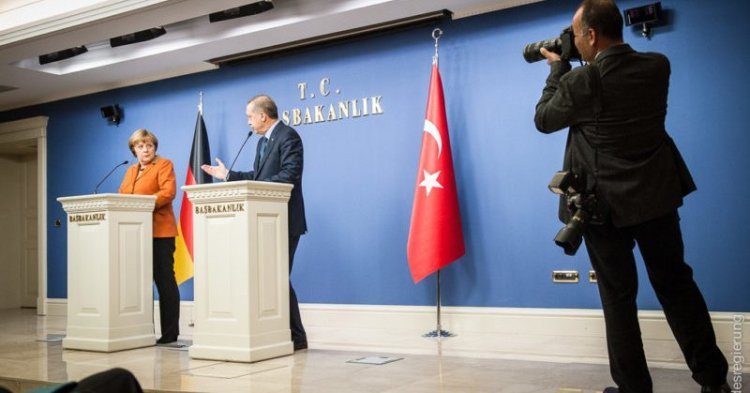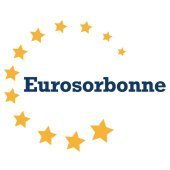The time of romance between Germany and Turkey seems long ago. Yet the story started well, with an agreement signed between Berlin and Ankara on 31st October 1961, to allow Turkish workers to get to German territory, as German industries were seeking an external workforce. This explains the important presence of citizens of Turkish origin in Germany, still today. Nevertheless, since the attempted military coup in Turkey in summer 2016, relations between both States have clearly strained, to the point where a palimpsest is being written, in which the previous century’s economic partnership moves on to political tensions in both governments’ agendas.
At present, nobody appears to want or to be able to step back, despite the mutual interests in maintaining good diplomatic relations. This situation leads to a double consequence: first, a reciprocal hostility between Angela Merkel and Recep Tayyip Erdogan, and second, a confirmed halt (was it still needed to be proved?) to EU membership. Turkey’s future, even if it gets away from Germany and Europe, does not seem destined to be written beside the Russia of Vladimir Putin either.
The authoritarian drift
Relations between Germany and Turkey have particularly deteriorated for the past two years. This is due to the authoritarian drift undertaken by the Turkish president, following the military coup that hit the country during the night of 16th July 2016. First, less than one year later, on 17th April 2017, a constitutional reform was adopted: it concentrated the powers around Recep Tayyip Erdogan and transformed the country in an autocracy de facto and de jure. Then, and in the meantime, a hunt against Gulen supporters [1] was widely carried out everywhere in the country, leading, amongst other things, to the arrest of German citizens, detained as political prisoners. According to the German government, at least 12 are still deprived of their liberty on this ground.
Accordingly, numerous key players were particularly vehement towards the machinations of the Turkish authorities and towards the measures to take. For example, the withdrawal of the systematic acquisition of double nationality established in 2014 was mentioned, as well as the prohibition from practicising for Turkish imams paid by Turkey under the aegis of the Diyanet (the Turkish Directory of Religious Affairs), accused of gravitating too much in Erdogan’s spheres. In 2017, this escalation of tensions took the form, in Germany, of obstructions to avoid the campaign in favour of the Turkish constitutional referendum to the one million and a half Turks able to vote on German territory. A practice which was shamefully labelled “nazi” by Ankara.
Mutual interests despite a fruitless dialogue
The protagonists are both conscious that this discord cannot lead to the end of diplomatic relations. The Chancellor is not willing to see the EU-Turkey refugee deal sacrificed, as she defended it actively and as it has importance in public opinion, especially in electoral periods. This would also be an unfortunate decision regarding German citizens still detained in Turkey. Their fate, in this perspective, would remain more than uncertain. Alongside, this is not desirable for Recep Tayyip Erdogan to close the doors of discussion to Germany either, as he would have to endure an important diplomatic setback, at the multilateral level. Berlin’s influence within the Union could be used to agree with a reinforcement of sanctions towards Turkey, especially by suspending the projects of deepening the customs union, and the visa exemption for Turkish citizens willing to go to Europe.
Despite a relatively poor political hand in this part, the threat to slow down the customs union is an advantage. Initiated in 1996, it is a success given that almost half of Turkish trade exchanges are done with the European Union. Moreover, the European Commission had proposed to modernise and intensify the customs union, before the clear deterioration of diplomatic relations with Germany. The threat waved by this argument certainly does not leave Ankara untroubled, and if the Turkish orientation continues in this risky way, unless the EU adopts an incredible weak attitude, it will have to engage dissuasive measures. In this fruitless game triggered by Turkey, all the actors, indeed in different proportions, will lose.
EU membership in the context of German election
Indirectly, the insecurity of relations between the two States was the subject of interrogations during the electoral campaign in Germany, as the candidates were called upon to make a stand on the question of Turkish membership to the European Union. However, the outcome of the scrutiny had no influence on this problematic. During the television debate of 3rd September, both Angela Merkel and Martin Schultz answered without concession to a debate which does not exist anymore (behind the scenes of European diplomacy): Turkey will not become a member of the European Union.
In a context where Germans are convinced that it is possible to hold Turkey via economic arguments, an additional lever lies in the European hands, as a complete break of pre-accession negotiations would lead, in addition, to the withdrawal of the financial aid that Ankara receives in this procedure thanks to the Instrument for Pre-Accession Assistance (IPA). As a priority, IPA’s funds are intended for reforms aiming in particular at guaranteeing democracy, state of law and fundamental rights. The budget given to Turkey in the 2014-2020 period is 4,45 billion euros. In return, if the withdrawal of this godsend will not start a formal break, it would certainly lead to the withdrawal of Turkey from the accession process. For now, Turkey is maintaining the status quo in order to not assume the political responsibility of the closure of this dossier. This being said, and despite strong criticisms against Turkey expressed by Jean-Claude Juncker on 13th September at the end of his State of the Union speech, there is no basis for thinking that evolutions will come up before the European Council’s next meeting in October.
What future for Turkey?
It may be tempting to think that an exit from its international isolation leads almost inevitably to Turkey and Vladimir Putin coming closer together. Yet, one must first remember that Turkey’s alliance with Vladimir Putin in Syria holds only to the interests of each party in the region, and does not eclipse the difference of opinion between Russia and Turkey on the remaining in power of Bachar Al Assad.
Moreover, the diplomatic relation between both countries appears fragile for several reasons. First, because it is widely (and mutually) based on the fear that this rapprochement can inspire to the international community, especially to Washington and Brussels. Then, because this rapprochement does not erase a reciprocal suspicion, still valid not long ago (murder of the Russian ambassador in Ankara on 19 December 2016; Russian plane shot down in Turkish airspace on 24th November 2015). Finally, because these relations are no substitute for the establishment of Turkish diplomacy in Europe after decades of ties and shared influence. For this reason, Turkey has indeed never been so away from Europe, but yet its destiny may not be elsewhere.




Follow the comments: |
|
